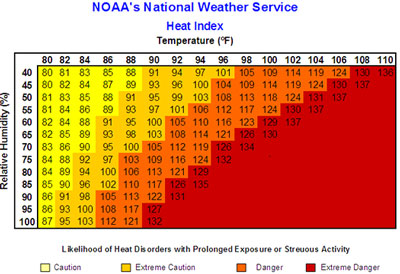Heat waves are a leading cause of weather-related fatalities and the havoc they create is expected to get worse in the future due to climate change, aging populations and more people living in cities.
The United States National Weather Service (NWS) defines a heat wave as a period of uncomfortably hot and unusually humid weather that typically lasts two or more days. The NWS issues health alerts when the heat index is expected to exceed 105 to 110 degrees Fahrenheit (41 to 43 degrees Celsius) for at least 2 consecutive days. The heat index is a measure of how hot it really feels when actual air temperatures are combined with measures of relative humidity.

Other countries have different health alert systems for heat waves. In colder climates, the thresholds for issuing heat-related health alerts are often lower than those in the United States because the heat is less tolerable for people acclimated to colder weather. Likewise, people can tolerate heat better in hotter climates and thresholds for issuing heat-related health alerts are often higher in warmer climates than those in the United States.
Regardless of where you live, exposure to excessive heat can be deadly.
According to the Centers for Disease Control and Prevention (CDC), approximately 700 people die each year from heat-related illnesses in the United States. During 1979 to 2003, more fatalities were caused by excessive heat than the number of fatalities caused by tornadoes, hurricanes, earthquakes, floods and lightening combined.
Fortunately, heat-related illnesses are preventable. The CDC offers the following advice for dealing with a heat wave:
- Drinks lots of water
- Avoid or reschedule strenuous activities
- Wear light-colored, loose fitting clothing
- If possible, move to cooler temperatures afforded by air conditioning
- Never leave children or pets in a parked car
- Check on elderly relatives and acquaintances to ensure their safety
For those of you who like to go above and beyond – do what you can to increase green space in your local community as this can help to reduce heat that gets trapped by urbanization. Also, consider taking an online course that will enable you to identify and respond to heat-related illnesses including heat cramps, heat exhaustion and heat stroke. Such courses are highly recommended for teachers, coaches and parents.











